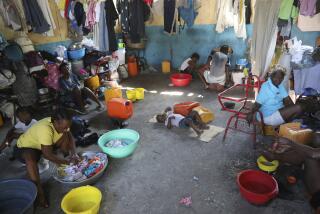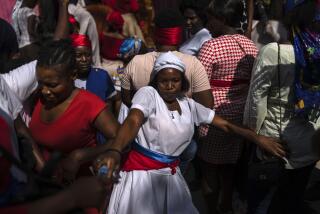Black Market Only Booming Segment of Haiti’s Chronically Depressed Economy
- Share via
PORT-AU-PRINCE, Haiti — Streets of the capital of the poorest nation in the Western Hemisphere are cluttered with crates of White Label Scotch, Marlboro cigarettes and tins of sardines.
Smuggling has reached catastrophic proportions in the last two years, merchants say, since Jean Claude (Baby Doc) Duvalier fled from the National Palace and a military leadership took over the country.
“They opened up the ports to any boat that wanted to come in,” importer Antoine Izmery said. “No customs, no regulations--and they bring in everything, all food items, beds, furniture, vehicles, everything.”
Izmery said he and other legitimate merchants estimate that half of all goods sold in Haiti today are illegally imported. A substantial portion is stolen merchandise from the United States.
Huge Discounts
In some places, new pick-up trucks are said to sell for as little as $400 cash. Pierre Cardin suits go for $10, the same price as for a racing bike. Some speculate that these goods are so cheap because they are stolen in the United States and used as payment for drugs shipped from Haiti to Miami.
Exact figures from the government are hard to come by, but a recent report from the Banque de la Republique de Haiti indicated that tax revenues from imports dropped 21.9% in 1987’s final quarter, from $72 million to $56 million.
New President Leslie Manigat has vowed to fight the problem. But merchants and political observers say the major smugglers are actually highly placed military officers, the same men believed to have rigged the January elections, which put Manigat in power.
“There has been some evidence of a crackdown against non-military smugglers,” said Pierre R. Bayard, publisher of the English-language Haiti Times. “But that’s only because the military want complete control.”
Col. Paul Implicated
Sources said that Col. Jean-Claude Paul, indicted in Miami earlier this year on drug trafficking charges, owns at least two ships that have been seen secretly plying Haiti’s unpatrolled harbors.
Paul heads the notorious 700-man Deassalines Battalion, which opposition leaders said stood idly by last Nov. 29 when gunmen shot more than 30 voters and bystanders during an aborted election.
Few observers in Haiti believe that Manigat has the power to curb smuggling conducted by the very men credited with rigging the January election, when independent journalists reported seeing busloads of voters ferried from polling place to polling place and said that many polls only gave out ballots bearing Manigat’s name.
“The military is his only support, so it would be a true test of his power if he tried to take away their livelihood,” said Serge Beaulieu, a member of parliament and director of the Caribbean Network Systems News Service. “This would be round one if he decided to take them on.”
Manigat Defended
But Minister of Information Roger Savain said in an interview that the ousted Duvalier regime was responsible for smuggling and that Manigat’s government “is fighting it very strongly.”
“We are closely controlling the disembarkment of goods from ships and the payment of duties,” he said.
Importers said that Haitian customs agents are easily bribed and that the docks hum with activity at night as illegal goods are unloaded.
If rampant smuggling is not curbed, it could spell economic disaster for the country, legal importers warn.
49% Unemployment
Smuggling provides a living for an untold number of people in a country where the average income is only $379 a year and the official unemployment rate is 49.1%.
But it is also draining revenue from the National Treasury, which must deal with massive aid cuts from the United States and other countries imposed after bloody aborted elections last Nov. 29.
Smugglers also are importing such staple crops as rice, depressing the price of Haitian-grown rice.
More to Read
Sign up for Essential California
The most important California stories and recommendations in your inbox every morning.
You may occasionally receive promotional content from the Los Angeles Times.













